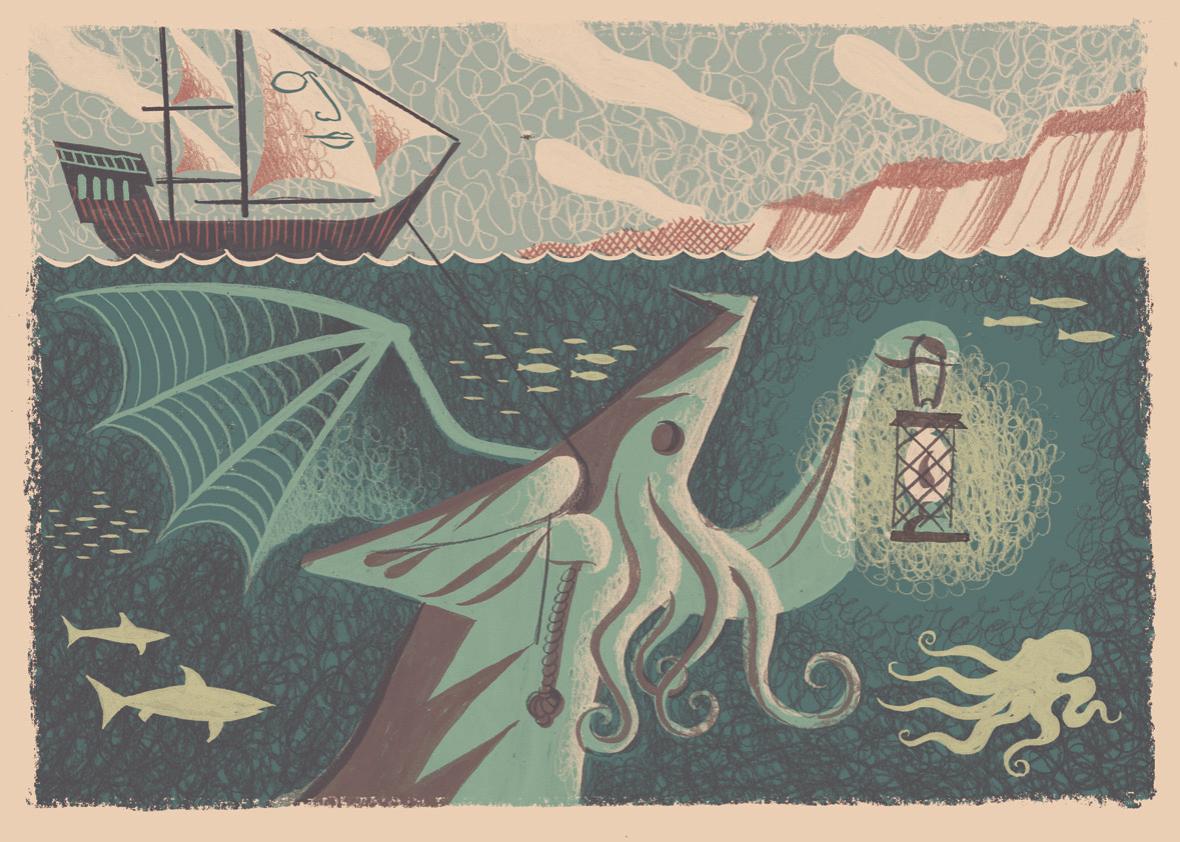I Felt in Danger for My Life â€⦠I Emptied My Revolver Then I Reloaded It and Did It Again
Lovecraft'southward Black Monsters
A thrilling novella digs into the racism embedded in the horror master's work.

Nick Hayes
In Victor LaValle's riveting horror tale The Ballad of Black Tom , a man is beckoned to the threshold of apocalypse with the hope of seeing across the fabric of reality. It'southward an impulse that underpins many of LaValle's novels and stories: a pursuit of what lurks across the surface, a desire to encounter conspicuously the monsters that we create. LaValle puts information technology to work powerfully in his new novella, the story of Tommy Tester, a xx-yr-old black human hustling to pay rent and accept intendance of his begetter in Harlem in 1924. After existence hired to deliver an cabalistic volume to a mysterious adult female in Queens, Tommy gets entangled in the plans of the wealthy Robert Suydam, who is intent on calling forth ancient gods, and Detective Malone, who investigates him.
Fans of H.P. Lovecraft will recognize these latter two characters—both white—and their plots from Lovecraft's story "The Horror at Scarlet Hook"; amid other things LaValle's novella is a clever retelling of Lovecraft'south story about occult forces at work in an immigrant neighborhood. The Ballad of Black Tom stands on its ain as a compelling weird tale of Jazz-age New York Metropolis, just its penetrating examination of Lovecraft's creations and how they reflect racism's profound influence on our cultural imagination is where it actually shines.
The Ballad of Black Tom couldn't be timelier, for Lovecraft'due south influence on pop culture is more powerful than ever, even as criticisms of his racism and xenophobia have swept through literary and fan circles. Equally if to betoken that we've reached critical consensus that the granddad of cosmic horror is profoundly problematic, last autumn the World Fantasy Awards announced that Lovecraft's visage would no longer appear on their trophy. Simply if we hold that racism is owned to his work, what do we do with Lovecraft now? What do we make of his imaginative legacy? Unsurprisingly, nigh modern writers and artists who borrow from Lovecraft distance themselves from problems with his texts and the human being himself. The Ballad of Black Tom is thrilling in office considering LaValle uses them instead every bit his starting indicate, re-imagining Lovecraft's universe through the optics of a black human being.
LaValle imagines Tommy Tester as a role of a living, breathing New York City: "Walking through Harlem first in the morning was similar existence a single drop of claret inside an enormous trunk that was waking up." Lovecraft loathed New York City. In his stories, civilization was always under attack from dark, archaic barbarism, and no place epitomized that battle similar New York. "The Horror at Red Claw" has get infamous for Lovecraft's racist depictions of "Syrian, Castilian, Italian, and Negro elements impinging upon 1 some other" in a "babel of sound and filth" that "repeat the darkest instinctive patterns of primitive half-ape savagery." LaValle flips the script on Lovecraft right from the kickoff, giving over the first half of his novella to Tester'southward point of view and placing him at the center of events reminiscent of Lovecraft'southward story.
In LaValle'southward tale, Tester is invited to exist a part of Robert Suydam's plot to conjure the Great Onetime Ones, aboriginal, tentacled creatures that are at the core of Lovecraft's mythos. Suydam opens Tester'due south eyes to the frightening cosmic indifference of the monsters. But when getting involved with Suydam brings down the law on Tommy, he realizes that in low-cal of the racist criminality of the NYPD,
a fright of catholic indifference suddenly seemed comical, or downright naïve… he saw the patrol cars parked in the middle of the road like three not bad black hounds waiting to pounce on all these gathered sheep. What was indifference compared to malice?
The globe will always be a devil'south bargain, Tommy realizes. It'southward just a matter of which devils he wants to deal with.
Tommy hustles for a living, merely it'southward also his survival skill. It allows him to navigate and exploit expectations of him as a black man: "Give people what they await and y'all tin can have from them all that you need." When Tommy appears in the 2d half of LaValle'due south novella—a retelling of "The Horror at Cherry Claw" from the bespeak of view of the story'southward original protagonist Detective Malone—he has go Black Tom, a subservient lieutenant of Robert Suydam. In The Ballad of Black Tom, Tommy channels his rage and suffering into a hustle that culminates in a grisly, claret-soaked climax in Red Claw. Information technology'due south a scene as enlightening equally information technology is frightening. Lovecraft pulled back the veil to testify the states his racist monsters; LaValle pulls dorsum the veil to evidence us how the monster of racism dooms us all.

Emily Raboteau
LaValle's novella is set nearly a century ago, merely it couldn't exist more relevant. A white detective recalls his murder of an unarmed black man in a "matter-of-fact tone": "I felt in danger for my life. … I emptied my revolver. Then I reloaded it and did it again." that'due south matched by the casual indifference of police force to the crime. The constabulary strength that Malone brings to Carmine Claw includes military course weapons like anti-aircraft guns that "looked like a trio of cannons, amend for a ground war than breaching the fronts of a building." The Ballad of Black Tom underscores that police shootings and the militarization of police in minority communities aren't new injustices, only part of the grinding mechanics of racism that have ever been at piece of work in our land, the ancient monster underneath American order since its beginning.
The hashtag #NoLivesMatter started appearing on Twitter final year as a response to #BlackLivesMatter, and tweets tagged with it oft characteristic images of Cthulhu or references to catholic indifference. Most are clearly intended every bit snarky jokes, only they're also oddly, possibly accidentally, insightful. For Lovecraft'southward cosmicism springs from the aforementioned fear underpinning the racist response "All Lives Matter": the fear that recognizing the subjectivity of black men and women threatens the social structure that assures and validates white superiority. In a letter to a friend in 1931—a letter asserting that "the black is vastly junior," and that Americans must be on guard confronting "racial and cultural mongrelism"—Lovecraft wrote:
Nothing means anything, in the end, except with reference to that continuous immediate textile of appearances and experiences of which i was originally part. … Hither we have the normal phenomenon of race-prejudice in a nutshell—the legitimate fight of every virile personality to live in a earth where life shall seem to mean something. … Just how the black and his tan penumbra tin can ultimately be adapted to the American fabric, yet remains to be seen. … No ane wishes them any intrinsic impairment, and all would rejoice if a way were found to amend such difficulties as they have without imperiling the structure of the ascendant fabric. It is a fact, however, that sentimentalists exaggerate the woes of the boilerplate negro. Millions of them would be perfectly content with servile status if expert physical treatment and amusement could be assured them.
Lovecraft fans often rationalize his racism as being a product of his time, or suggest that nosotros should expect "beyond" information technology. But Lovecraft'due south cosmic horror was a deeply racist construct, irrevocably linked to a need to assert white superiority. As some critics and writers have started to argue, that's all the more than reason we should not dismiss it. In The Ballad of Black Tom, LaValle is not just interested in interrogating Lovecraft, but in agreement how he continues to both reflect and shape our imaginations. Now, more than ever, it's of import to remember that white anxieties nevertheless reside in the places where black and brownish monsters lurk.
—
The Ballad of Black Tom past Victor LaValle. Tor.
Encounter all the pieces in the Slate Book Review .
beasleyspladebeforn.blogspot.com
Source: https://slate.com/culture/2016/03/victor-lavalles-the-ballad-of-black-tom-and-the-work-of-h-p-lovecraft.html
0 Response to "I Felt in Danger for My Life â€⦠I Emptied My Revolver Then I Reloaded It and Did It Again"
Post a Comment